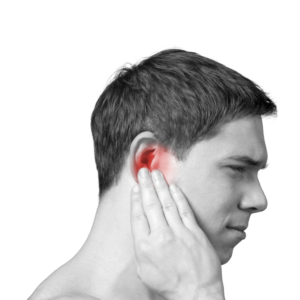03 Jul Will TMJ disorder resolve on its own?
 TMJ disorder and the symptoms it produces can have profound effect on a person’s daily life. From decreased oral function to debilitating orofacial pain, TMJ disorder drastically reduces a person’s quality of life. Most of the time, TMJ disorder and its symptoms can be mitigated with professional treatment from a dentist. Common treatment options include rebuilding the bite with restorations, wearing prescription nightguards, or implementing stress reduction techniques into one’s daily life. Sometimes, symptoms of TMJ disorder can improve when patients are not under significant stress but this isn’t common. Since most TMJ disorder sufferers’ symptoms do not improve on their own, it is best to consult with a dental professional for treatment.
TMJ disorder and the symptoms it produces can have profound effect on a person’s daily life. From decreased oral function to debilitating orofacial pain, TMJ disorder drastically reduces a person’s quality of life. Most of the time, TMJ disorder and its symptoms can be mitigated with professional treatment from a dentist. Common treatment options include rebuilding the bite with restorations, wearing prescription nightguards, or implementing stress reduction techniques into one’s daily life. Sometimes, symptoms of TMJ disorder can improve when patients are not under significant stress but this isn’t common. Since most TMJ disorder sufferers’ symptoms do not improve on their own, it is best to consult with a dental professional for treatment.
What is TMJ disorder exactly?
TMJ disorder is a condition that involves strain and dysfunction of the temporomandibular joint. The temporomandibular joint (TMJ) moves the mouth in a variety of positions. From opening the mouth to moving side-to-side for chewing, the TMJ is employed every time we eat, speak, laugh, or yawn. If this joint is stressed by a malocclusion and worn dentition or if it affected by a developmental abnormality or trauma, the TMJ may not move itself and surrounding tissue like muscles or ligaments properly. If the TMJ doesn’t move properly, oral function can be severely disrupted. TMJ dysfunction can produce symptoms like orofacial pain, headaches, tooth wear, and lockjaw. Patients with TMJ disorder tend to experience popping or clicking sensations when they move their mouths.
What causes TMJ dysfunction?
TMJ disorder can be caused by a different underlying issues. For instance, issues with a patient’s bite caused by misaligned teeth or jaws and tooth wear contribute to the dysfunction of the TMJs. Developmental abnormalities of the jaws or the TMJ are also a common factor with this condition. Since the causes of TMJ dysfunction vary, it is best to have a consultation with a professional.
How can a nightguard help?
A prescription nightguard can ease the symptoms of TMJ disorder by relieving stress on the joint while you sleep. This oral appliance will also protect your teeth (and restorations) from damage and wear caused by bruxism and reduced oral function.
For more information, call us today to schedule a consultation.


